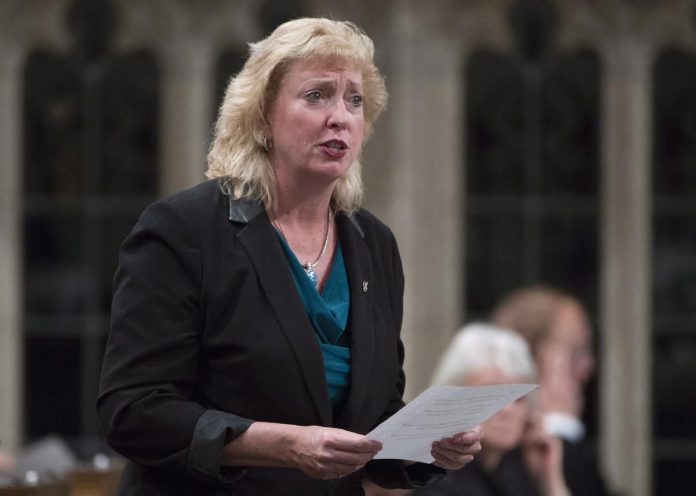[ad_1]
OTTAWA — The Mexican government is taking a Conservative MP to task for implying that many Mexican visitors to Canada are involved in the illegal drug trade.
Sarnia, Ont., MP Marilyn Gladu made the suggestion Wednesday during debate on the Trudeau government’s bill to legalize recreational marijuana.
Her reference to Mexicans came as she was arguing that legalization will actually be a boon for the illicit black market in cannabis — contrary to the government’s contention that it will displace organized crime.
She said legal pot will be more expensive than the “going price” of $7 per gram on the black market. And she slammed the government for allowing individuals to grow up to four marijuana plants per dwelling, arguing that organized crime has increased in Colorado because it allows home-grown weed.
“We can see how profitable organized crime has been there,” she told the House of Commons.
The Mexican embassy hit back in a written statement.
“The embassy strongly disagrees and rejects any assertion that singles out or pretends to portray Mexicans as criminals,” it said.
“Comments based on stereotypes are inaccurate and hurt the dignity of the Mexican people and should be avoided.”
In an interview, Gladu initially doubled down on her comments.
“I would point to some of the statistics that we had before the visa (requirement) was lifted,” she said.
“There were about 9,000 (Mexicans) that were coming to Canada and it was costing us about $15,000 and taking about six months before they were deported and there was a large percentage that were of the criminal element.”
She appeared to be referring to the fact that 9,462 Mexicans sought asylum in Canada in 2008 — more than half of whom were rejected for not having valid refugee claims.
The following year, Stephen Harper’s Conservative government imposed a visa requirement on Mexicans wanting to enter Canada. It justified the move by pointing to an increase in bogus asylum claims from Mexicans whom the government argued were really economic migrants, not refugees fleeing persecution. Keeping criminals out of the country was not a big part of the rationale.
The Liberal government lifted the visa requirement in 2016.
“Now, they don’t know who’s coming in,” Gladu said in the interview. “Certainly, everyone has seen too many movies with drug cartels but it’s rife in Mexico.”
According to intelligence reports obtained by Global News last year, dropping the visa requirement did indeed lead to an increase in Mexican criminals trying to enter Canada — although they remained a tiny fraction of overall Mexican travellers to the country.
Just 0.25 per cent of the 156,000 Mexican nationals who entered Canada between 2012 and 2015, when visas were required, were implicated in crime, Global reported, including 29 linked to organized criminal groups, another eight with “possible links” and “likely more” who hadn’t been identified.
Midway through 2017, after the visa requirement was lifted, Global reported that the Canada Border Services Agency had already identified 65 Mexican nationals it said were involved in “serious” crimes. Another 15 were cited for national security reasons.
However, that same year, the overall number of Mexican visitors to Canada increased by 45 per cent, the embassy said in its statement, adding that the numbers grew by another 27 per cent in the first quarter of 2018. In addition, it said more than 25,000 Mexican agricultural workers come every year to work on Canadian farms.
“There is no basis to sustain any link, whatsoever, between increased mobility and criminal activity. Both Mexican tourists and seasonal workers contribute to the Canadian economy.”
Asked if she had any second thoughts about her reference to Mexicans during Wednesday’s debate, Gladu suggested her comments were made “in the passion of making your speech.”
“I wouldn’t say the Mexicans are more prone to drug crimes than the organized crime we already have in Canada,” she said.
“We have a $9-billion marijuana business operating today illegally in the country so we certainly have our own home-grown criminals, if you could call them that.”
[ad_2]








